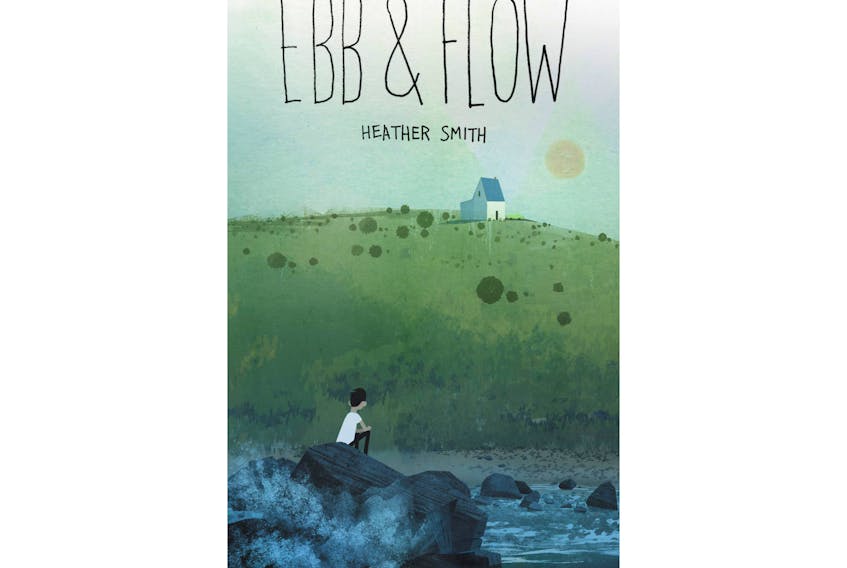
Heather Smith’s “Ebb & Flow” won the Winterset Award this year, garnering a major cash prize of $12,500 and besting hefty competition from playwright Robert Chafe (“Between Breaths”) and novelist Melissa Barbeau (“The Luminous Sea”). Chafe has a solid track record and Barbeau is well launched in fiction, but Smith’s name was new to me. Who was this literary giant-killer?
Turns out that Smith, who hails from Newfoundland and now lives in Waterloo, Ont., released “Ebb & Flow” as her third piece of young adult fiction, a followup to “Bay Girl” and “The Agony of Bun O’Keefe.” Apparently, not one to rest on her laurels, she’s since published “Chicken Girl.”
Critics have noted her touch with nuanced situations and traits. Her Newfoundland roots are often transposed into her settings. Both are evident in “Ebb & Flow” — as well as a new format. The words are laid out like poems; instead of chapters there are free verses and stanzas, each separately titled, and running usually about a page (but sometimes just a few lines and other times a couple of pages). Dialogue is not set off by quote marks but italicized.
This allows Jett, the main character, not just a largely Interior perspective but gives shape to his interiority. There’s a dynamic and push to his thoughts. Which of course references the kinetics of the book’s title:
Summer
One summer
after a long plane ride
and a rotten bad year
I went to Grandma Jo’s.
It was my mother’s idea.
Jett, what you need is a change of scenery.
I think she needed a change of scenery, too.
Jett flies in from the mainland, to an unidentified Atlantic Canadian airport. But the reader knows it’s close to where Jett’s dad is serving a lengthy prison sentence — it would be a spoiler at this point to reveal why. Grandma Jo is a pair of welcoming arms and a head of hair dyed blue; “She called herself/the cotton candy granny.” She knows Jett needs to talk about what has happened and why he is there, but she gives him space and time. They eat “fish and chips/drowned in vinegar” and she gives him “the room in the attic/the one with the view of the sea./Of all the rooms/in all the world/it was the awesomest room/of them all.” A wooden butler, Marmaduke, serves as a bedside table, and a stuffed bear sits on a chair in the corner. Jett hides this away as soon as possible: it reminds him too much of someone named Alf.
Jett is down on himself, for his father, for his poor performance in school, and for something he did with his friend Junior Dawson. He tries to drown these judgments and memories but they always bob back to the surface.
Grandma Jo seacombs for glass. Just off the beach is a rock, the lion, accessible at low tide but divided from shore when it’s high. “Good,” Jett thinks. “I will deserve it./I will deserve to be stranded/on an island/all by myself.” But he’s not alone for long. “Grandma climbed to the top of the lion./(She was always stronger than I expected.)/You okay?/I have all this stuff in my head.”
Jett’s grandmother makes weekly visits to a boarding house, where the roommates include “Smelly Nelly,” whom Jett remembered as panhandling on a downtown sidewalk, a man who warns of an alien invasion, and a man with a beard which might look like Santa Claus’s except it’s yellow. Grandma Jo makes a list of the groceries Nelly needs. But Jett steals the only nice possession Nelly has. “I don’t know why.” It’s another burden of guilt.
“Mom asked me once/if I regretted what I did./I lied and said no./Junior and me/we had a catchphrase:/NO REGRETS./It was like one of those/bouncy safety nets/that firefighters held/at the bottom of burning buildings/whenever I felt like I was falling/I’d whisper NO REGRETS/and I’d bounce so high …”
Jett had met Junior at school. Anyone could see Junior was trouble, a hard ticket. Even Jett can see that, but that’s the attraction. By hanging around Junior, Jett can take on that mantle of toughness, his meanness, by proximity or osmosis. If Junior doesn’t care about anything, then Jett won’t either.
Except he does. Particularly Jett’s uncle, the “big, little man,” Alf. Junior, who is bullied even more than he bullies, has an escape plan and Alf is the key. Jett’s fraying sense of decency is Alf’s only protection. This arrow of events shoots Jett to Grandma Jo’s. And he must weigh and accept the trail of damage.
Joan Sullivan is editor of Newfoundland Quarterly magazine. She reviews both fiction and non-fiction for The Telegram.
Previous column:
JOAN SULLIVAN: Linehan Young’s latest an evocative look at 19th-Century Newfoundland









